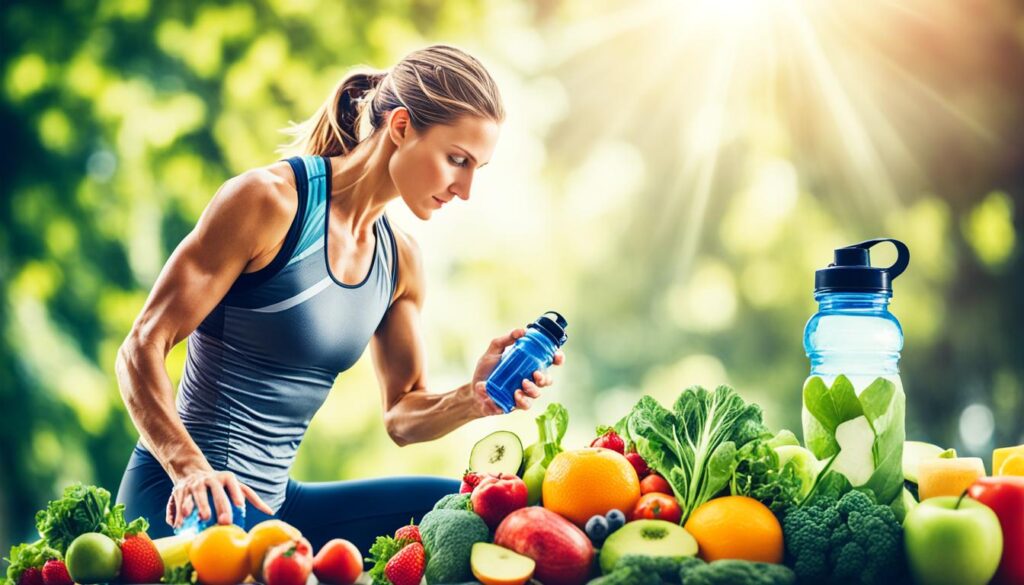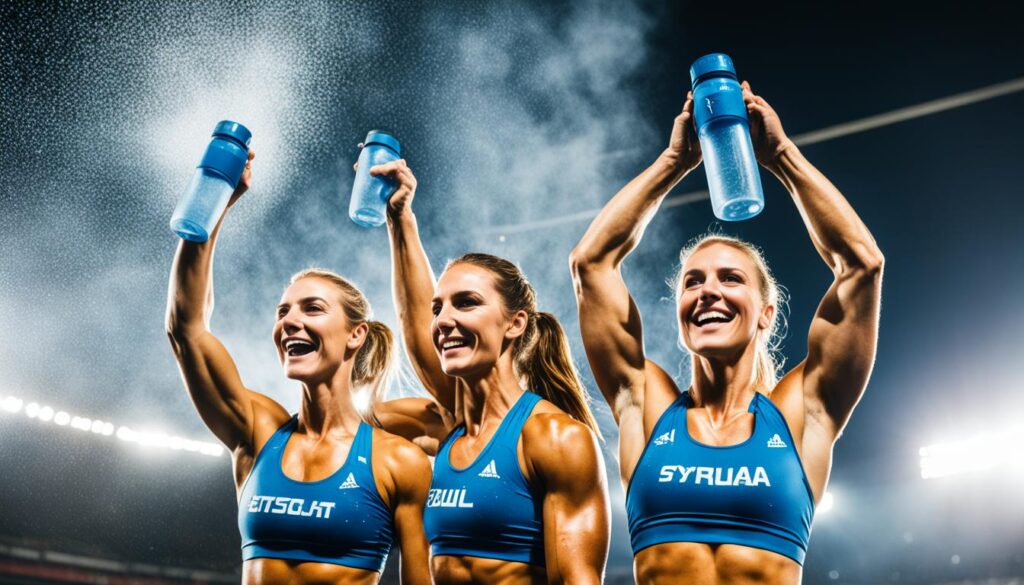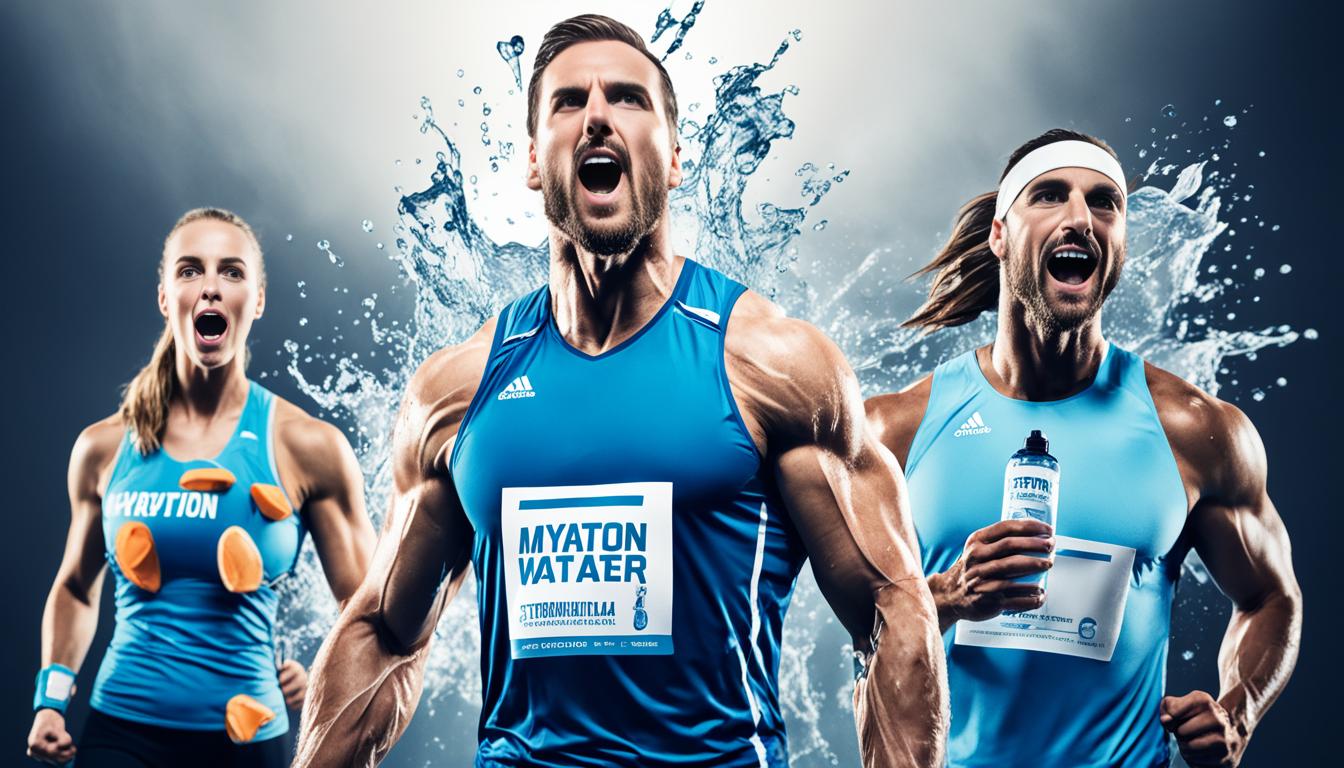For athletes striving for peak performance, understanding the intricacies of hydration for athletes is as important as any training regimen. The role of proper water intake for athletes cannot be understated; it is a key component not just for optimal performance but also for injury prevention and recovery. Despite the widespread knowledge of dehydration’s adverse effects, many athletes fall short in their hydration strategies, often misconstruing thirst as the prime indicator for hydration needs.
With the fast-paced nature of competitive sports, the importance of sports hydration is sometimes overlooked. Education on hydration is necessary for athletes, coaches, and health staff to implement successful hydration tips and tactics that will ensure that athletes are well-prepared for the physiological demands of their sport. It’s time to dispel myths and adopt hydration practices that are backed by science to maintain excellence in athletic endeavors.
Key Takeaways
- Effective hydration is fundamental for athletic performance and recovery.
- Common misconceptions about hydration can lead to poor hydration strategies.
- Preventative hydration is more effective than trying to rehydrate during or after exertion.
- Individual hydration needs should be tailored to the athlete’s specific sport, conditions, and body requirements.
- Educating on the right hydration techniques helps athletes perform at their best.
The Critical Link Between Hydration and Athletic Performance
As we delve into the factors influencing Athletic Performance, the importance of hydration cannot be overstated. Proper hydration needs are pivotal for optimal performance, significantly impacting an athlete’s endurance, power, and overall health. Establishing effective hydration protocols is paramount for athletes to compete at their highest level. In this section, we will explore the science behind hydration and its direct link to athletic success.
Understanding the Role of Hydration in Sports Performance
Hydration extends beyond merely quenching thirst; it’s a critical component of the body’s overall functionality during physical exertion. When the body is properly hydrated, it can perform various physiological functions that are essential for optimal athletic performance. Adequate fluid intake ensures proper joint lubrication, body temperature regulation, and the delivery of energy-producing nutrients to active muscles.
The Physiology of Dehydration and Its Impact on Athletes
Dehydration occurs when the body loses more fluid than it takes in, leading to a decline in blood volume. This reduction forces the heart to work harder to pump blood throughout the body, compromising oxygen and nutrient delivery to working muscles. The result is an increased risk of fatigue, decreased endurance, muscle cramps, and overheating, all of which can detrimentally impact an athlete’s performance.
Recognizing and Addressing Hypohydration in Athletes
To combat the negative effects of dehydration, it is essential for athletes and their supporting teams to recognize the early signs of hypohydration. Common indicators include muscle cramps, weakness, decreased coordination, and fatigue. Early recognition and intervention – through timely and appropriate fluid replacement strategies – can prevent these symptoms from escalating and protect the athlete’s health and performance capabilities. Training sessions and competitive events should be accompanied by planned hydration breaks, tailored to the individual’s sweat rate and environmental conditions. Engaging in a well-crafted hydration protocol not only supports athletic performance but also enhances recovery and readiness for subsequent training or competition.
Hydration for Athletes: Tailoring Water Intake for Optimal Performance
When it comes to Athletic Performance, one critical factor often receives less attention than it deserves: hydration. Yet the impact of tailoring water intake to individual athlete’s needs can profoundly influence performance outcomes. Recognizing this, the National Athletic Trainers’ Association places significant emphasis on structured pre, during, and post-activity hydration needs. By adjusting water, electrolyte, and carbohydrate intake according to specific physiological demands, athletes can maintain energy, enhance recovery, and extend their capacity to perform.
Understanding individual hydration needs is not just about consuming fluids; it’s about considering factors such as body mass, sweat rate, and the environmental conditions under which an athlete performs. These aspects necessitate a custom approach that tailors water intake for optimal performance, culminating in an effective hydration protocol that can truly distinguish between an exceptional performance and a mediocre outing.
The hydration recommendations are as follows, aiming to prevent dehydration and its energy-sapping consequences:
- Pre-Activity Hydration: Begin with 500 to 600 ml of water or a sports drink 2 to 3 hours before physical activity.
- Immediate Pre-Activity Hydration: Top off hydration levels with an additional 200 to 300 ml of fluid 10 to 20 minutes before.
- Durational Hydration: During physical activity, aim to approximate sweat and urine losses, keeping body weight loss under 2% by consuming 200 to 300 ml of fluids at 10 to 20-minute intervals.
- Post-Activity Hydration: Focus on correcting any fluid losses post-exercise, which can support recovery and prepare the body for the next challenge.
Through hydration, which is effectively tailored to the athlete’s unique circumstances, there’s potential not just for improved physical condition but also for the mental boost needed for top-notch competition.
To convey the importance of hydration better and to illustrate the recommended practices more clearly, the table below offers a distilled visualization:
| Activity Phase | Intake Amount | Fluid Type | Suggested Timing |
|---|---|---|---|
| Pre-Activity | 500-600 ml | Water/Sports Drink | 2-3 hours before exercise |
| Immediate Pre-Activity | 200-300 ml | Water/Sports Drink | 10-20 mins before exercise |
| During Activity | 200-300 ml every 10-20 min | Water/Sports Drink | Throughout activity |
| Post-Activity | Varies based on fluid loss | Water/Sports Drink | After exercise |
Hydration tips are not only about water intake; they also incorporate the strategic use of sports drinks. With the right balance of electrolytes and carbohydrates, these beverages can be crucial in achieving a state of optimal performance. This bespoke approach—one that roots itself in science and tailors each detail to the individual—sets the stage for athletic success and showcases the importance of hydration for maintaining peak physical condition.
Effective Hydration Strategies for Different Athletic Disciplines
Competing at the highest levels in sports demands targeted hydration strategies. Different athletic disciplines carry varying hydration requirements because of factors like the intensity, duration, and environment of the activity. Addressing these unique needs is essential to develop individualized hydration protocols that match the specific demands of the sport. Understanding the connection between sweat rates and fluid loss across diverse athletic events is the first step toward optimizing sports hydration.
Sweat Rates and Fluid Needs in Diverse Athletic Events
Each sport has its own characteristics that influence an athlete’s sweat rate and subsequent fluid needs. For instance, endurance athletes might experience substantial electrolyte and fluid depletion over extended periods, while those in high-intensity sports face acute bouts of sweating over a shorter duration. Acknowledging these varied requirements encourages the adoption of sophisticated hydration strategies tailored to the distinct nature of each sport.
Individualized Hydration Protocols for Endurance vs. High-Intensity Sports
Designing individualized hydration protocols necessitates an acute understanding of the sport’s specifics. Endurance sports such as marathon running may require a steady intake of fluids with electrolytes over a longer time frame to compensate for prolonged sweat loss. In contrast, sports that involve short, high-intensity bursts of activity may need a more concentrated pre-event hydration strategy to ensure athletes start off in an optimal hydration state.
Preventing Hydration Barriers in Track and Field Throwers and Similar Sports
Unique to track and field throwers and similar events are the logistical challenges that may impede hydration—such as restricted access to fluids during competition. Coaches and health staff must identify these potential barriers to implement practical solutions that ensure athletes have regular access to water or sports drinks during their event, aligning with effective sports hydration practices.
To visually illustrate the distinct hydration needs in various sports disciplines, refer to the following table outlining sport-specific approaches:
| Sport Category | Sweat Rate | Hydration Need | Hydration Approach |
|---|---|---|---|
| Endurance (e.g., Marathon) | High over extended period | High electrolyte & fluid loss | Continuous intake; Electrolyte supplementation |
| High-Intensity (e.g., Weightlifting) | Acute during activity | Quick fluid loss; Rapid recovery | Pre-activity hydration; Immediate recovery drink |
| Team Sports (e.g., Soccer) | Moderate to high | Moderate fluid & electrolyte loss | Pre-game hydration; Intervals during play |
| Field Events (e.g., Discus Throw) | Variable | Erratic access to fluids during event | Strategize fluid access points; Educate on personal hydration cues |

Committing to specialized hydration strategies not only enhances athletic performance but also mitigates the risk of dehydration-related setbacks. By closely analyzing individual sweat rates and sport-specific fluid needs, team support staff can craft sports hydration plans that allow athletes to perform at their peak, no matter the discipline.
Hydration Considerations: Timing, Quantity, and Quality
Every athlete knows that maintaining hydration is crucial, yet navigating the specifics of hydration considerations can be a complex science. To achieve effective pre-activity hydration and ensure post-activity rehydration, athletes must pay attention to the timing, quantity, and the quality of hydration. Mastering these principles helps to optimize water and electrolyte balance which is vital for sustained athletic performance and recovery.
Pre-Activity Hydration Strategies and Fluid Intake Timing
In the quest to enhance pre-activity hydration, the focus should be on not just the amount but also the timing of fluid intake. Consuming 500 to 600 ml of water or a sports drink 2 to 3 hours before the activity provides a hydration base line, while topping up with an additional 200 to 300 ml, 10 to 20 minutes before the event, can bring fluid levels to an optimum. This meticulous approach ensures that athletes start their physical endeavors adequately hydrated, bolstering both endurance and performance.
Optimizing Water and Electrolyte Balance During Exercise
Diligent athletes should aim to optimize water and electrolyte balance throughout their training or competitive event. Optimal balance is maintained by replacing fluids at regular intervals, ideally 200 to 300 ml of water or electrolyte-enhanced sports drinks every 10 to 20 minutes. This replenishment helps to compensate for fluid losses and sustains muscle function and energy levels during strenuous activities.
Post-Activity Rehydration: Key to Recovery and Sustained Performance
Equally critical is post-activity rehydration, which replenishes fluids lost during physical exertion and aids in the recovery process. The goal is to consume sufficient fluids, typically water or sports drinks, post-exercise to correct any fluid loss. This not only supports muscle recovery but also prepares athletes for future performance demands.
Assessing and Confirming Hydration Status for Athletes
The final piece in the hydration puzzle is confirming hydration status. Techniques such as monitoring urine color or assessing pre- and post-activity body weight changes can provide insights into an individual’s hydration needs. These assessments allow athletes to tweak their hydration strategies to ensure consistent performance and well-being.
Below is an illustrative guide to hydration strategies catering to the needs of athletes before, during, and after their sports activities:
| Hydration Phase | Fluid Guidelines | Activity Considerations |
|---|---|---|
| Pre-Activity | 500-600 ml of water or sports drink 2-3 hours prior 200-300 ml 10-20 minutes before |
Prepare body’s fluid levels for impending exertion |
| During Activity | 200-300 ml of fluid every 10-20 minutes | Maintain performance and prevent dehydration |
| Post-Activity | Replenishment proportional to fluid loss | Aid recovery and facilitate future performance readiness |
Embracing these strategies not only augments an athlete’s capability to perform but also protects against the potential detriments of inadvertent dehydration. The guidance of experienced dieticians and sports nutritionists can be invaluable in implementing a hydration protocol that is attuned to the unique requirements of each athlete.

Conclusion
Summing up the discussion on water intake for athletes, we’ve delved into the importance of staying hydrated for maintaining optimal performance, preventing injuries, and ensuring efficient recovery post-exercise. To attain peak physical condition and performance, athletes must adopt a hydration protocol that goes beyond responding to thirst. The potent trifecta of pre, during, and post-activity hydration accommodates the body’s fluid requirements, setting up athletes for success in their respective sports endeavors.
Key to this process are hydration tips precision-engineered to serve the dynamic hydration needs of each individual. This bespoke approach, leveraging insights on body weight, environment, and sweat rates, equips athletes with the know-how to preemptively manage their fluid intake and electrolyte balance. By monitoring hydration status with practical tools such as urine color charts and body weight measurements, athletes can finely tune their protocols to their unique physiological demands.
Ultimately, acknowledging and addressing the specifics of hydration needs ensures that athletes are at their best when they step into the competitive arena. Implementing smart water intake strategies and personalized hydration protocols can significantly impact an athlete’s endurance, concentration, and overall health, emphasizing the critical role of hydration in their journey toward optimal performance.




